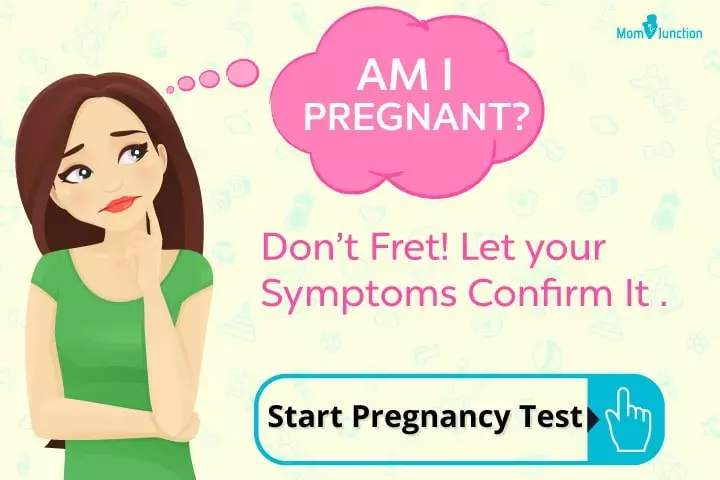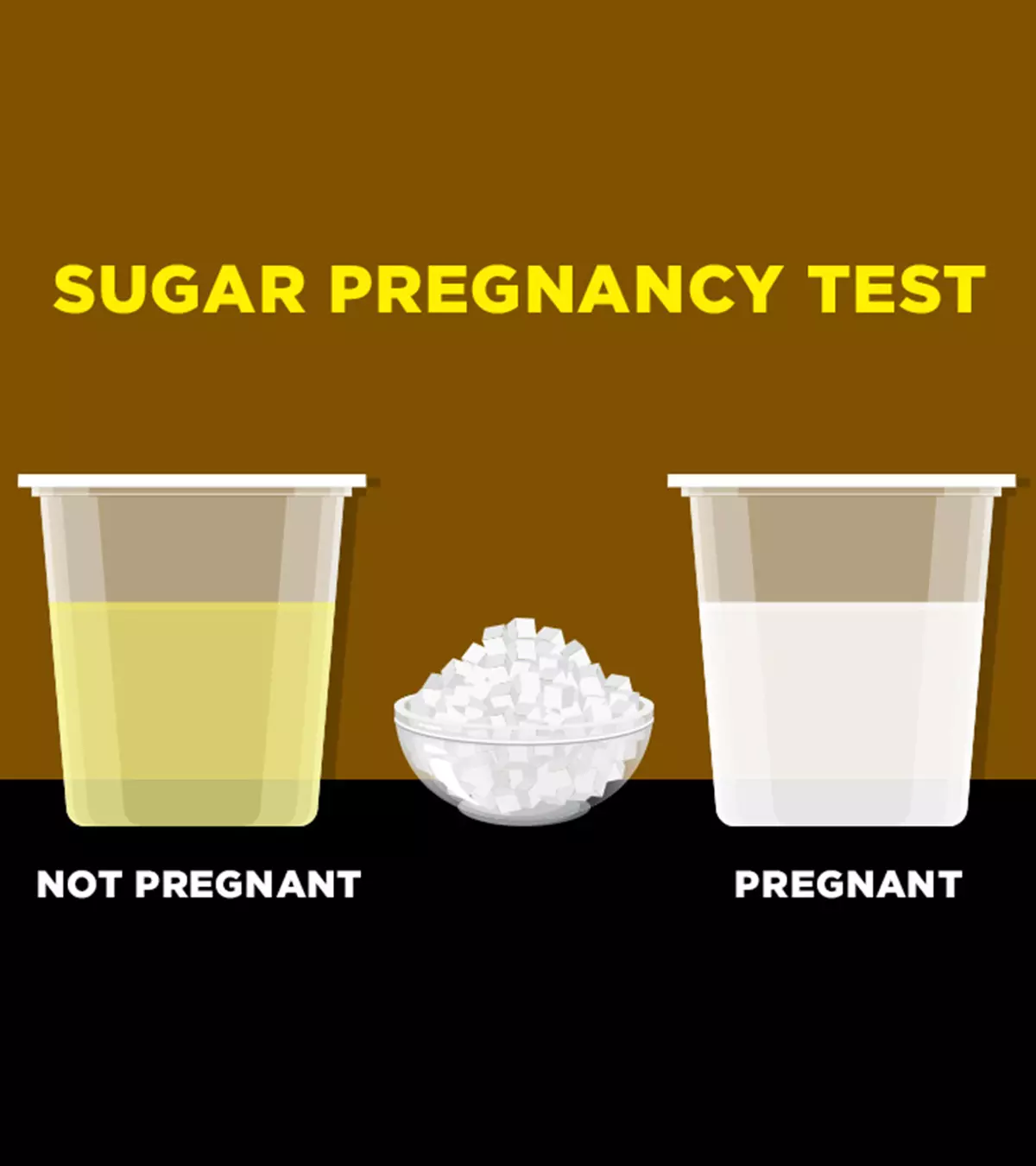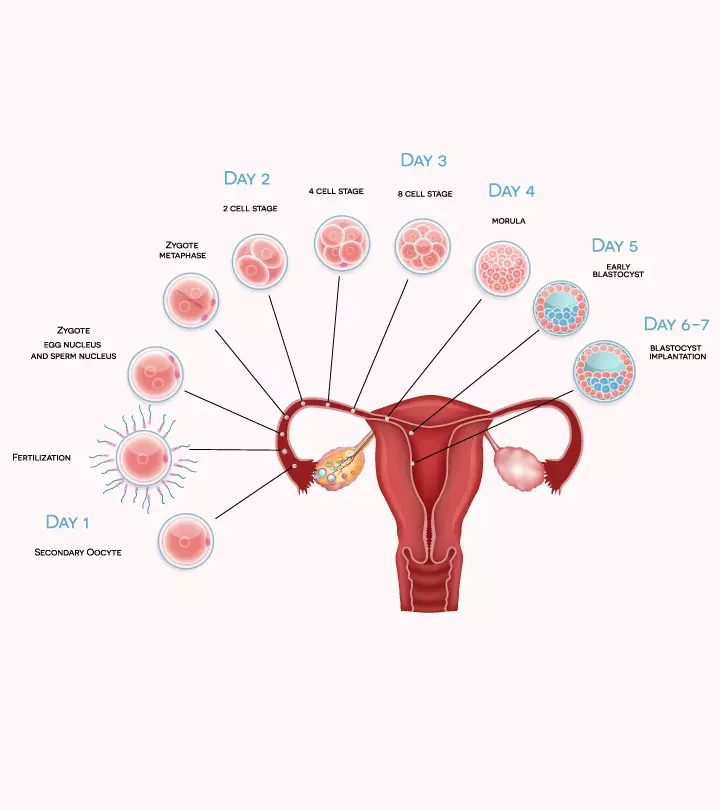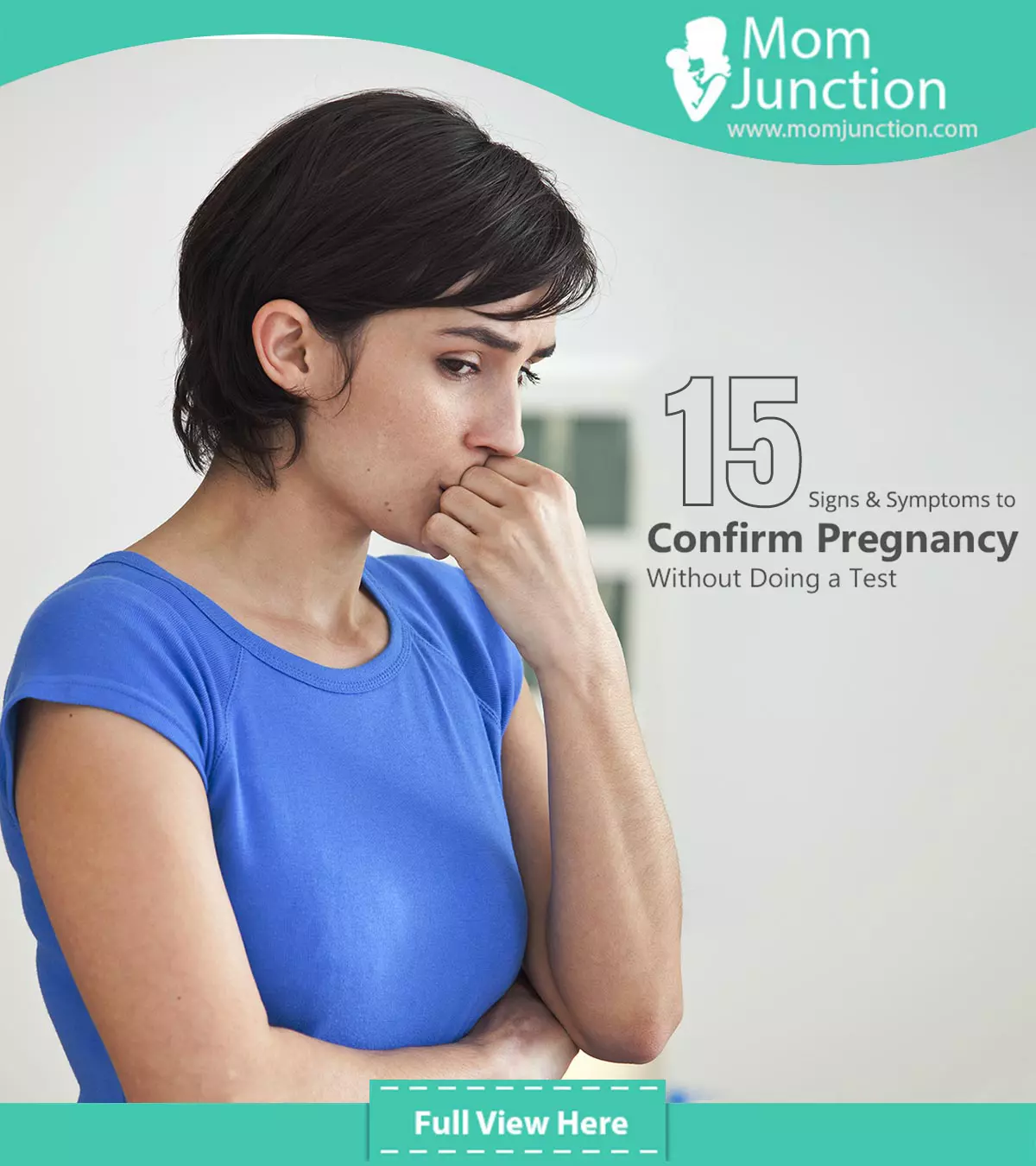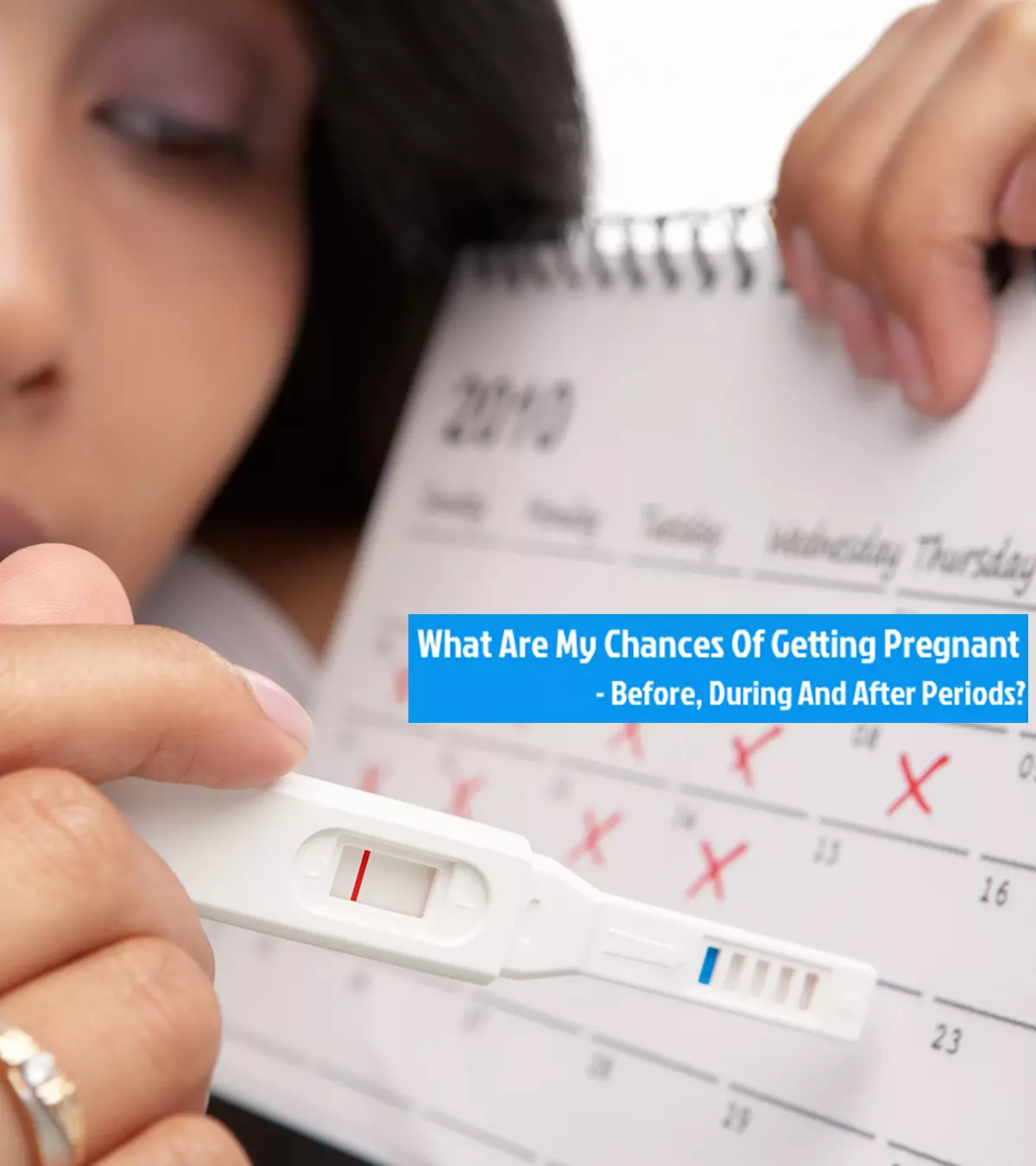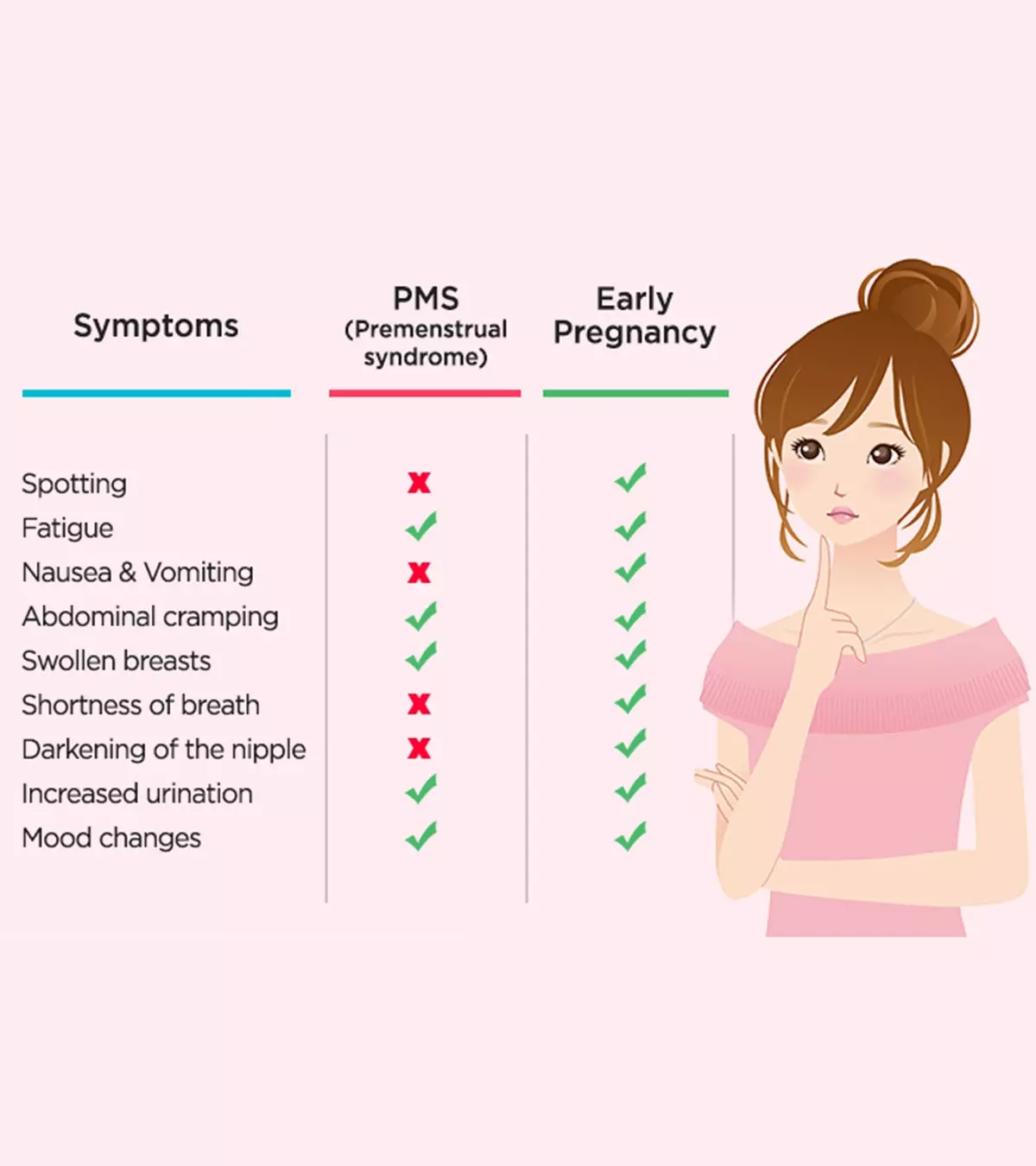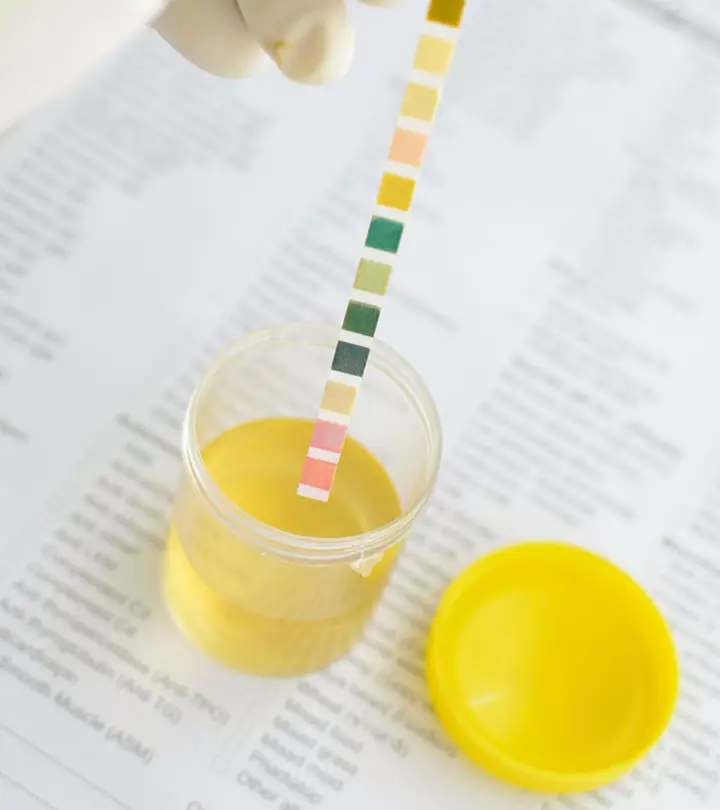
Image: Shutterstock
You must have heard about the symptoms that mark early pregnancy, such as morning sickness, breast changes, and fatigue. However, it is possible to get a positive pregnancy test without any symptoms. If this happens to you, take a second test or consult a doctor. In addition, you may need to undergo blood and urine tests to confirm whether you are pregnant or not.
In this post, we explain some of the possible reasons behind a positive pregnancy test with no symptoms and when to see a doctor. We also address some frequently asked questions, such as whether it is possible to be pregnant and not test positive.
Key Pointers
- A positive pregnancy test can occur without any symptoms.
- Possible reasons for this include not noticing early signs, testing too early, confusing symptoms with other conditions, ectopic pregnancy, or a false-positive result.
- A false-negative result may happen if the test is taken too soon, done incorrectly, or with diluted urine.
- If you get a positive pregnancy test, it’s crucial to see a doctor for blood and urine tests, and an ultrasound.
Positive Pregnancy Test But No Symptoms: Why Does It Happen?
Pregnancy tests check your urine or blood for hCG (human chorionic gonadotropin) hormone.
Your body is likely to produce this hormone about six days after fertilization (1), and the hormone levels may double every two to three days (2).
Micaela Cook, an expectant mother, talks about being pregnant without encountering any early signs of pregnancy, “I got pregnant, and I had the least amount of symptoms. I didn’t have cramping, bloating, heavy urination, breast tenderness, fatigue, nausea, or food aversions. I tracked my cycle on the flow app and documented my symptoms. Out of all the cycles that I had previously documented, I experienced the least amount of two-week symptoms in the cycle that I was pregnant. Even my mood swings and irritability were much less (i).”
Pregnancy symptoms vary widely. Some women notice signs early, while others may not experience symptoms until much later. If the test result shows positive, but there are no accompanying signs that you are pregnant, the following could be the possible reasons.
- You may not have recognized the early symptoms: Implantation occurs about the same time your menstrual period is due. You might have taken the light bleeding and cramping (as a result of implantation) (3) for a period.
- You may have taken the test too early: Some women start experiencing symptoms a week or two after conception, while others may experience it after a few months. It takes about six to 12 days for the fertilized egg to attach to the uterus (4) and become viable, after which you may take the test. The test result may come positive but the symptoms might take time to appear.

Image: Shutterstock
- You may have attributed the symptoms to some other causes: You might have taken certain symptoms such as nausea or dizziness for something else other than pregnancy. For instance, you might think that fatigue was a result of a long workweek or strenuous activity, and your mood swings have been caused by stress.
- You may experience subtle changes: You may not always have visible changes such as edema, morning sickness, or frequent urination. Sometimes, you may only experience subtle changes such as fatigue, minor appetite changes, aches, or mood swings, which are hardly noticeable. Hormonal fluctuations can also affect the perception of symptoms.

Image: Shutterstock
- Ectopic pregnancy. It is a condition wherein the fertilized embryo implants outside the uterus in 95% of cases in the fallopian tube. It is not viable but still produces hCG (5).
- False-positive pregnancy test results: False–positive test results may also occur when the test shows positive even if you are not pregnant. This could happen due to factors that may mess with the pregnancy test results. These factors may include:
- Chemical pregnancy : It is a miscarriage that occurs before you know you are pregnant. A low level of hCG could be present in the blood or urine and may give a positive result (6).
- Fertility medications, anti-anxiety medications, anticonvulsants, antihistamines, antipsychotics, and diuretics may also cause false positives if you take the test immediately after taking the course of medicine (7).
 Quick fact
Quick factWhen To See A Doctor?

Image: Shutterstock
A positive test without symptoms can cause uncertainty and anxiety. If you have a positive test result, it is crucial to follow up with your doctor for appropriate prenatal care. They may conduct a blood test (serum beta HCG) and a urine test to confirm your pregnancy. These may be followed by an ultrasound to (a transvaginal scan can detect pregnancy as early as five weeks) check for the gestational sac and determine if the pregnancy is normal. Furthermore, pregnant women must undergo regular fetal ultrasound scans during subsequent doctor visits to assess fetal health, development, and movement and support good maternal health.
You may check your basal body temperature at home, which usually remains elevated during pregnancy. However, it’s essential to consult with your gynecologist to confirm your pregnancy and discuss any concerns you may have.
 Did you know?
Did you know?Frequently Asked Questions
1. Can I get a positive pregnancy test in the fourth week?
Pregnancy test at home might give you a positive result at four weeks of pregnancy. However, it is recommended that you wait for a week after a missed or late period and then take a pregnancy test (8).
2. Is it possible to be pregnant and not test positive?
Sometimes, you might get a negative test result, even when pregnant. It is called a false-negative, which might happen if you take the test too early in pregnancy (when hCG levels are low), the test kit is used incorrectly, or you have used diluted urine (drank excessive fluids before the test, or you have taken the test in the latter part of the day) (9).
4. Does no symptoms mean that I’ll have a miscarriage?
Not having pregnancy symptoms from the beginning doesn’t mean you will have a miscarriage. However, if there is a sudden loss of pregnancy symptoms and symptoms such as vaginal bleeding, abdominal pain, or an ectopic pregnancy, it might be a miscarriage (12). Only medical tests can confirm a miscarriage.
If you receive a positive pregnancy test but no symptoms, the chances are that you may have taken the test too early or might not have followed the steps accurately. Nevertheless, you can always retake the test after a few days or consult your doctor to participate in standard pregnancy blood tests. However, there are also chances for the test to result in false negatives. Therefore, seeking a doctor’s opinion to confirm pregnancy and ensure good reproductive health is recommended, rather than relying solely on home pregnancy kits.
Infographic: Why You May See A Positive Pregnancy Test Without Symptoms
When you spot a positive pregnancy test, you may be expecting pregnancy-related symptoms to begin after that. Nevertheless, there may be several reasons for not having symptoms despite a positive test result. Here is an infographic discussing a few causes for a positive pregnancy test without symptoms.
Some thing wrong with infographic shortcode. please verify shortcode syntax
Illustration: Positive Pregnancy Test But No Symptoms: 6 Possible Reasons

Image: Dall·E/MomJunction Design Team
Are you already 5 weeks pregnant, but don’t have any symptoms? Find out if this is normal or if there is any cause for worry. Also, know the signs requiring medical assistance during early pregnancy.
Personal Experience: Source
MomJunction articles include first-hand experiences to provide you with better insights through real-life narratives. Here are the sources of personal accounts referenced in this article.
i. Positive pregnancy test with no two week wait symptoms.https://www.youtube.com/watch?feature=shared&v=cwTkuzHGFD4
References
- PA Nepomnaschy et al.; Urinary hCG patterns during the week following implantation; Hum Reprod. (2008).
https://www.ncbi.nlm.nih.gov/pmc/articles/PMC5330618/ - HCG (Urine); University of Rochester Medical Center
https://www.urmc.rochester.edu/encyclopedia/content?contenttypeid=167&contentid=hcg_urine - Pregnancy: Am I Pregnant? Cleveland Clinic
https://my.clevelandclinic.org/health/articles/9709-pregnancy-am-i-pregnant - Alok Sharma and Pratap Kumar; Understanding implantation window a crucial phenomenon; J Hum Reprod Sci. (2012).
https://www.ncbi.nlm.nih.gov/pmc/articles/PMC3409914/ - Vanitha N Sivalingam et al.; Diagnosis and management of ectopic pregnancy; J Fam Plann Reprod Health Care (2012).
https://www.ncbi.nlm.nih.gov/pmc/articles/PMC3213855/ - “TWEAKING“ THE TEST; University of Utah Health
https://healthcare.utah.edu/healthfeed/postings/2015/07/070715_tweaking - Can You Get A False Positive Pregnancy Test Result? AVAIL
https://www.availnyc.org/false-positive-pregnancy-test - Knowing if you are pregnant; Office on Women’s Health U.S. Department of Health and Human Services
https://womenshealth.gov/pregnancy/you-get-pregnant/knowing-if-you-are-pregnant - Pregnancy testing; Better Health Channel; State Government of Victoria Australia
https://www.betterhealth.vic.gov.au/health/healthyliving/pregnancy-testing - 7 Reasons Your Pregnancy Test Gave A False-Positive
https://www.thesource.org/post/reasons-your-pregnancy-test-gave-a-false-positive - What is a Cryptic Pregnancy?
https://americanpregnancy.org/getting-pregnant/what-is-a-cryptic-pregnancy/ - Miscarriage signs and symptoms
https://www.tommys.org/baby-loss-support/miscarriage-information-and-support/about-miscarriage/miscarriage-symptoms
Community Experiences
Join the conversation and become a part of our nurturing community! Share your stories, experiences, and insights to connect with fellow parents.
Read full bio of Subhashis Samajder
Read full bio of Rebecca Malachi
Read full bio of Swati Patwal
Read full bio of Aneesha Amonz

